Iran's Imprisoned Nobel Laureate Again Denied Medical Care
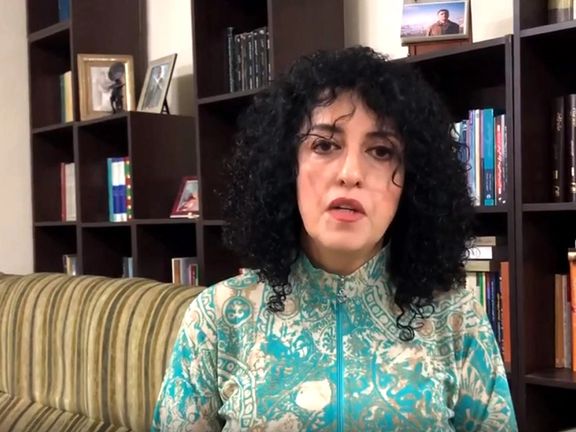
Narges Mohammadi, the imprisoned Nobel Peace Prize laureate, was once again denied medical care for refusing to wear the mandatory hijab.

Narges Mohammadi, the imprisoned Nobel Peace Prize laureate, was once again denied medical care for refusing to wear the mandatory hijab.
In a post on her Instagram, an audio file was shared in which female prisoners chant, "Prisoners, Support, Support!"
Originally scheduled for a cardiac angioplasty on Wednesday, Narges Mohammadi's transfer from Evin Prison to the hospital was thwarted, citing her refusal to comply with mandatory hijab, a position she has stood firm on during her years in and out of detention.
Medical tests conducted last week revealed Mohammadi's critical health condition, including "blockage in two heart arteries, fluid accumulation around the heart, and severe inflammation of the gallbladder."
Mohammadi had previously reported her transfer to the hospital on November 8, without a headscarf and wearing a business suit. However, she returned to prison shortly afterward.
Since November 6, Mohammadi had been on a hunger strike in protest against the "Islamic Republic's policy of delaying medical attention for sick prisoners, risking the health and lives of human beings" and "the policy of death or compulsory hijab for Iranian women." She was refusing to comply with hijab laws in exchange for treatment.
Following her civil rights activism, Mohammadi was awarded the Nobel Peace Prize in 2023. International human rights organizations, including Reporters Without Borders, strongly condemned denying Mohammadi access to medical care, and the Nobel Committee expressed severe concern about her health.
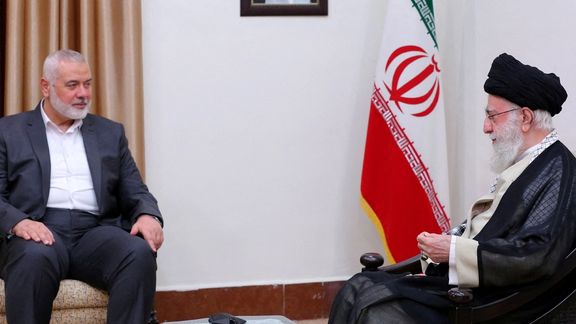
Iranian regime officials claim they had no warning of the October 7 invasion of Israel by its proxy Hamas, according to Reuters.
The claims come as the world’s eyes are on Tehran, which has long funded the group designated a terror organization by the likes of the UK and US. Tehran has also provided military, technical and operational support to Hamas for years.
According to Reuters, three sources have claimed that “Iran's supreme leader delivered a clear message to the head of Hamas when they met in Tehran in early November … You gave us no warning of your Oct. 7 attack on Israel and we will not enter the war on your behalf.”
This message apparently delivered by three regime officials contradicts a string of meetings between the top echelons of the Islamic Republic and leaders of both Hamas and Iran-backed Lebanese Hezbollah, over the course of this year. This went as high up as the Supreme Leader when in April, Hamas announced that its political leader, Ismail Haniyeh, was visiting the Supreme Leader in Tehran.
Reuters claims that on this latest visit earlier this month, “Ayatollah Ali Khamenei told Ismail Haniyeh that Iran -- a longtime backer of Hamas -- would continue to lend the group its political and moral support, but wouldn't intervene directly.”
As soon as war broke out, the US voiced its support of Israel, sending warships and personnel to the region, fearing a wider escalation with Iran at the helm.
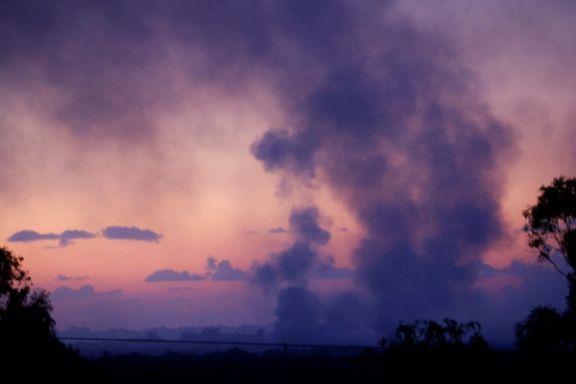
Iranian officials have repeatedly made the claim that they were not involved in the terror attack, but the government immediately on October 7 praised the invasion and ordered street celebration, with large banners erected within hours.
Yet regime and Hamas sources speaking to Reuters claim “The supreme leader pressed Haniyeh to silence those voices in the Palestinian group publicly calling for Iran and its powerful Lebanese ally Hezbollah to join the battle against Israel in full force”.
While Hamas and Hezbollah leaders had met with increasing frequency in the lead up to the attack which was to be the most deadly single day for Jews since the Holocaust, with the murder of 1,200 mostly civilians and a further 240 taken hostage, regime insiders dispute Hezbollah also had knowledge of the devastating attack which was to take place.
“Hezbollah too, was taken by surprise by Hamas' devastating assault last month that killed 1,200 Israelis; its fighters were not even on alert in villages near the border that were frontlines in its 2006 war with Israel, and had to be rapidly called up,” Reuters reported.
One Hezbollah commander told the news agency, ”We woke up to a war”, in spite of multiple meetings in recent months.
The latest statements distancing himself from the war, which has seen Iranian proxies in Lebanon, Syria, and Yemen launch attacks on Israel, will shock the Supreme Leader’s domestic audience who have for years heard his cries of annihilating the Jewish state and his ‘final solution’.
On Israel’s northern border, Hezbollah has engaged in the heaviest clashes with Israel for almost 20 years, but has avoided a full-fledged war. Speaking to Israel Today, Middle East expert Professor Meir Litvak reiterated the final command of its proxies will always come from Khamenei.
“Khamenei detests Israel with all his heart and wishes for its destruction. He also did not hide his great joy at what happened to us. However, he is cautious. He does not want direct Iranian involvement, and it is very important to him that there be no Israeli hit inside Iran. That is why he is determined and sophisticated in using his proxies, Hezbollah for example, who will do the job,” he said.
“Khamenei had an opportunity on October 7, but he also has a historical vision, so he is not in a hurry to destroy Israel right now. His ideological view is that Israel's blood must be shed, brought to its collapse so that it will submit to Iran's demands and no longer exist as a Jewish state.”
In what appears to be the most coordinated attack since the regime was founded in 1979, it seems unlikely that Tehran has not been at least highly informed of operations at the highest levels. Jason Brodsky, policy director at United Against A Nuclear Iran, noted the Reuters report’s sourcing. “It's Iran's regime and Axis of Resistance, so what they're telling Reuters is meant to protect Tehran. A lack of Iranian foreknowledge of October 7 is hard to believe,” he said.
"But Tehran not intervening directly, only through proxies, as well as Khamenei's frustration of Hamas operatives complaining about Iran's regime's support and requests to silence them are more believable,” he added.
Iran-backed proxies have even attacked US forces in Iraq and Syria, triggering fears of a full scale war. But as the US now enters discussions with Iran to unfreeze yet more funds, the likelihood is that Tehran knows it is the time to step back.
Last month, Iran’s foreign minister said that US officials had tried to discuss restarting nuclear talks but insisted Washington must first release $10 billion of Tehran's frozen funds as a sign of good will.
Indirect talks to revive the 2015 nuclear accord broke down in June and Iran has since rejected direct talks with the United States.
However, while Iran has billions of dollars of its frozen assets in foreign banks, mainly from exports of oil and gas, which it cannot access due to US sanctions on its banking and energy sectors, the war in Gaza and annihilation of Israel, may be lower down the list.
Earlier this year, the US unblocked $6bn from south Korea in exchange for the release of five dual-nationals held in Iran, a move which drew international condemnation fueling fears of its emboldening the regime and reinforcing its diplomatic hostage policy.
As Iran’s economy is on its knees and the world watches the number one sponsor of state terror, according to the US, and its next moves, it is perhaps playing a long game.
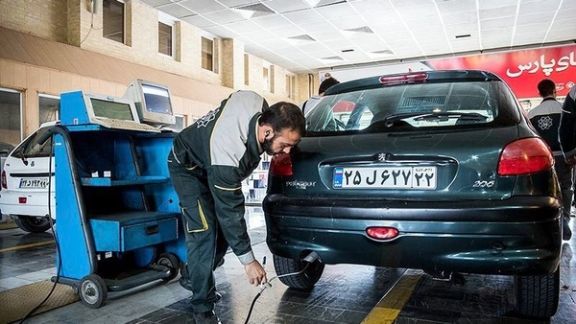
Iranians, unable to afford proper repairs, are resorting to renting car parts to secure technical inspection certificates, putting citizens' lives at risk.
Shadi Maleki, the CEO of the Technical Inspection Headquarters of Tehran, speaking to the ISNA news agency, highlighted a growing issue where some vehicle owners are using rental parts, particularly catalytic converters and tires, to pass mandatory technical inspections.
Catalytic converters, crucial for reducing air pollution by purifying toxic gases from fuel combustion, have become mandatory in inspections. With most of Iran’s cars unroadworthy, it has bred a black market for parts to help ensure they pass under new regulations.
Maleki explained that the absence of the catalytic converter's serial number on vehicle cards makes it challenging to identify rental parts during inspections.
The situation is exacerbated by economic challenges in Iran where people cannot afford to upgrade their cars. This has been exacerbated as drivers faced a recent 30% increase in insurance premiums.
Furthermore, recent reports on October 14 revealed that the Ministry of Industry has approved a 20% increase in the price of car tires, adding to the financial burden on vehicle owners.
A decade-long lack of economic growth, coupled with international sanctions impacting oil export revenues, has strained the country's financial stability.
The situation raises concerns not only about the safety of vehicles on the road but also underscores broader economic challenges that Iranians are grappling with. High inflation rates, increasing poverty levels, and the pressing issues of road accidents and pollution further compound the complexity of the situation.

The Iranian regime continues its crackdown on dissidents, targeting women’s rights, labor and union activists, environmentalists, and religious minorities in recent weeks.
In the past week alone, there have been reports of the arrests of two female former political prisoners in Tehran, two female environmental activists and journalists as well as two female writers, and a female animals rights activist in Rasht, two male citizens in Izeh who participated in the anniversary ceremonies for two of last year’s protest victims – nine-year-old Kian Pir-Falak and sixteen-year-old Milad Saeedianjou – as well as the latter’s sister in the same city and several others elsewhere.
Security forces who raided the home of female journalist and former political prisoner Shaghayegh Moradi in Tehran on Monday morning seized some of her personal belongings and took her with them to her mother’s house to search the premises. It is not clear which security body is responsible for the arrest and where she is being kept.
Mahnaz Tarrah, former political prisoner, however, was violently arrested on the street and taken to a court stationed at Evin Prison.
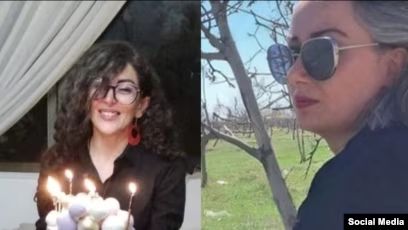
Farzin Rezaei-Roshan, also a former political prisoner, who was with Tarrah at the time of her arrest said in a video he released on social media that he was violently assaulted by the over a dozen agents who arrested his friend.
Rezaei-Roshan who is seen in the video in bloodied clothes says the agents used tasers and broke his head before taking his friend away.
In Rasht, capital of the northern province of Gilan, writer Rozita Rajaei was arrested Saturday and journalists Nasim Tavafzadeh and Helaleh Nategheh were arrested two days later. Both journalists had carried out research and written extensively about waste management, a big environmental problem in the region.
Like most other cases, there is very little information on these arrests in Rasht, but writer Nina Golestani’s husband said in an Instagram post that his wife was arrested by the Revolutionary Guards’ intelligence organization on her way home from shopping.
Due to censorship regulations, the mainstream media in Iran do not report on the majority of dissidents’ and activists’ arrests, which often involve unnecessary violence and maltreatment as well as confiscation of computers and mobile phones of not only the person being arrested, but of all other members of the family.
Information including reason for arrest and place of detention is often withheld even from the families of detainees by the authorities.
Social media users, however, actively inform the public of the arrests the regime strives to hide from the public and its human rights violations.
Pressure has also been high on Sunnis and followers of the Baha’i and Yarsan (Ahl-i Haqq) faiths that the regime does not recognize and considers as heretical unlike Christianity, Judaism and Zoroastrianism which have legal status in the Constitution.
The homes of the followers of the Baha’i faith, the largest non-Muslim religious minority in Iran, who have been persecuted since the Islamic Revolution of 1979 were raided in these cities by armed security agents last week with at least 19 people arrested and their personal belongings including electronic devices impounded.
The recent arrests have raised the number of Bahai’s arrested in the past month to at least 32 all of whom are still in prison.
The four members of the mystical Yarsan faith’s advisory council arrested in Kermanshah Province on Friday were reportedly freed after a few hours of interrogation but there is very little information on a Sunni cleric Abdulhakim Shahbakhsh who was arrested by security forces in Zahedan on November 8.
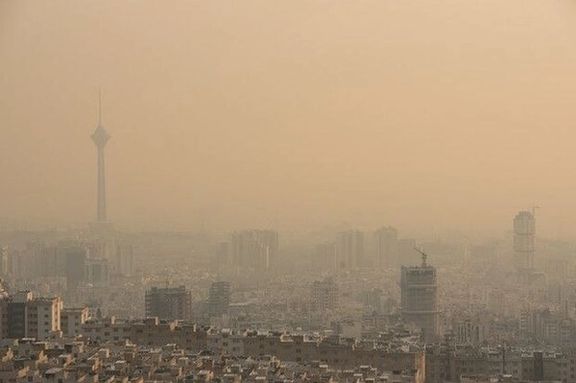
The Iranian Meteorological Organization has warned of worsening air pollution in the nation's five major cities with several schools moving to online learning.
The air quality in five cities, Tehran, Karaj, Arak, and Esfahan (Isfahan), has been put in place until Thursday, signifying a level of air quality deemed "very unhealthy."
Mehdi Pirhadi, a member of parliament, expressed concern about the deterioration of air quality and the rising concentration of pollutants. He highlighted that the number of polluted days in major cities this year has seen a notable increase compared to the previous year.
Pirhadi underscored the critical issues hindering effective response measures, including the lack of financial resources, inadequate supervision, and the low priority given to air pollution by officials. He emphasized that “a budget ranging from one to two billion dollars annually over a four-year plan is essential to address the air pollution crisis, but unfortunately, this matter is not receiving sufficient attention in budget planning.”
In response to the accumulating pollutants, the Emergency Air Pollution Situation Committee of Tehran has mandated that one-third of employees across all executive bodies will work remotely on Thursday.
In Isfahan, the Emergency Air Pollution Committee decided to extend school closures for the third day this week. The air quality in Isfahan reached the red level on Tuesday, prompting the committee to declare the closure of higher education centers too.
The escalating air pollution issue in Iran is further exacerbated by the country's heavy reliance on fossil fuels. Experts say pollution sources have surged in recent years, with a staggering 94% of the country's energy being derived from fossil fuels.
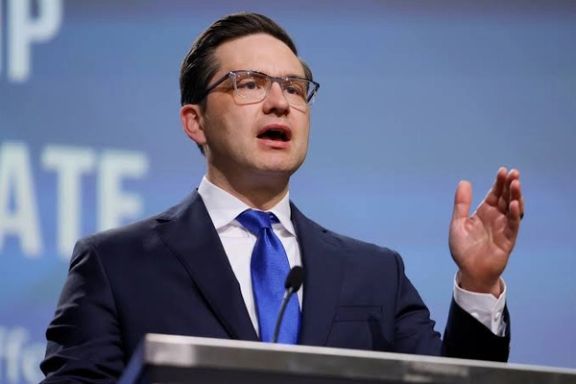
The Canadian opposition leader has called for immediate action against the Iranian regime, following revelations detailing its interference in Canada.
The report released by the Canadian outlet Global News focused on the ongoing threat against Iranian dissidents given the number of regime insiders operating in Canada.
Pierre Poilievre called the immense scope of the problem “shocking” and the number of agents mentioned in the report, which is approximately 700, “staggering”.
“To think that we might have terrorist-linked Iranian regime thugs operating with impunity, spending stolen money and intimidating Canadian Jews and Iranians is appalling,” he told Global News. The situation necessitates “immediate action to kick them out of this country,” the prime ministerial candidate added.
The Conservative leader had already pledged that his administration would list Iran's Islamic Revolutionary Guard Corps (IRGC) as a terrorist organization in Canada if elected, along with the US which took the move in 2019.
Among the non-governing parties in the House of Commons, Pierre Poilievre's Official Opposition Party has the most seats. Polls and projections indicate that the Conservative party will lead the upcoming federal election, for the 45th Canadian Parliament, scheduled for October 20, 2025.
Currently, Canada has expanded targeted sanctions against some IRGC members and amended its Magnitsky legislation in order to allow it to go after individuals accused of human rights abuses and corruption, but the opposition says that these measures do not suffice.